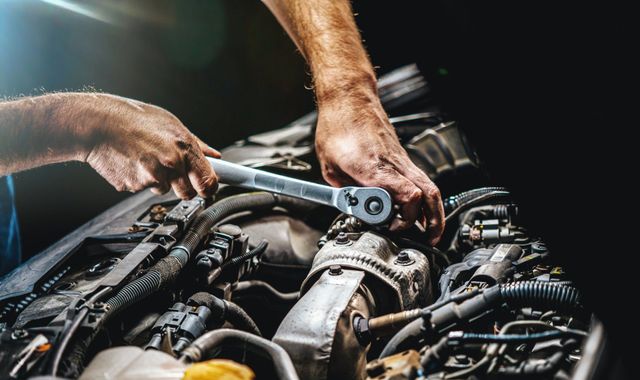All Categories
Featured

Keeping your cars and truck in peak condition needs attention to various upkeep jobs, with liquid checks being amongst the most necessary. Lorry fluids play critical duties in guaranteeing smooth operation, safety and security, and longevity. Disregarding liquid maintenance can result in considerable efficiency problems or pricey repair services. Listed below, we'll check out the value of checking and maintaining your car's liquids and pointers for doing so efficiently.
- Engine Oil: Protecting Essential Elements. Engine oil ensures that the relocating components of your engine continue to be moisturized, minimizing friction and protecting against overheating. With time, engine oil breaks down or ends up being infected, lessening its efficiency. Without proper lubrication, engine components can use out rapidly, bring about reduced efficiency or complete failing.
Just How to Preserve: Check the oil degree utilizing the dipstick and complete if necessary. Follow your car's service schedule for oil changes, usually every 3,000 to 7,500 miles, depending upon the sort of oil and your driving practices. 2. Coolant: Taking Care Of Engine Temperatures. Coolant, or antifreeze, aids manage your engine's temperature level, preventing overheating in summer season and cold in wintertime. As it circulates, coolant soaks up excess warmth and resolves it via the radiator. Gradually, pollutants can build up, or the liquid may break down, decreasing its efficiency.

Exactly How to Maintain: Consistently inspect coolant degrees in the storage tank and evaluate for leaks or staining. Flush and change coolant as suggested, typically every 2 to 5 years. 3. Transmission Liquid: Smooth Gear Operation. Transmission fluid lubes the transmission system and ensures smooth equipment shifts. A well-kept transmission fluid stops overheating and safeguards internal components from wear. Stopping working to maintain this fluid can lead to expensive repair work or substitutes.
How to Preserve: Examine the liquid degrees (if your car has a dipstick for transmission liquid) and monitor its color. Scorched or dark liquid suggests it's time for an adjustment, commonly every 30,000 to 60,000 miles. 4. Brake Liquid: Ensuring Safety And Security. Brake fluid is essential for transferring stress from your foot on the brake pedal to the stopping system, allowing your cars and truck to stop effectively. Gradually, brake liquid can soak up wetness, minimizing its boiling point and jeopardizing braking efficiency.
Exactly How to Maintain: Check the brake fluid level and problem. If it appears dirty or dark, have it replaced. Lots of makers advise changing brake liquid every 2 years or as required. 5. Power Steering Fluid: Easy Maneuverability. Power steering liquid enables effortless and smooth steering. Reduced levels or polluted fluid can make guiding tough, raising the threat of crashes.
Exactly How to Keep: Check the liquid routinely and refill if levels are low. Watch out for leakages, which can cause guiding system damage if unsolved. 6. Windshield Washer Fluid: Clear Visibility. Not connected to efficiency, windshield washing machine fluid is crucial for preserving exposure. It aids keep the windscreen clean, specifically during negative weather condition or when dirt collects.

How to Keep: Re-fill the storage tank as required and utilize washing machine liquid designed for your environment to avoid freezing or streaking. Best Practices for Liquid Maintenance. Adhere to the Supplier's Set up: Describe your vehicle's proprietor guidebook for upkeep periods certain to your cars and truck. Monitor for Leaks: Finding fluid leakages early can stop serious damage. Search for puddles or spots under your vehicle. Make Use Of the Correct Fluids: Always make use of fluids advised by your car's producer to avoid compatibility problems. Take Notice Of Indication: Dashboard caution lights, weird scents, or uncommon efficiency can suggest fluid-related troubles. The Benefits of Routine Liquid Checks. Enhanced Efficiency: Liquids in excellent condition aid all systems run smoothly. Prolonged Life expectancy: Proper lubrication and cooling prevent premature damage on parts. Improved Safety and security: Brake fluid and coolant are essential for secure driving. Price Savings: Attending to fluid concerns early can prevent pricey repair work later on. Final thought. Checking and maintaining your vehicle's fluids is a vital but simple component of automobile ownership. By devoting time to this important maintenance, you ensure your lorry remains trusted, risk-free, and efficient for many years ahead. Normal fluid checks assist avoid failures and offer you satisfaction when driving. Whether it's oil, coolant, or brake fluid, remaining positive with maintenance is the vital to lasting vehicle health.
Latest Posts
Refinancing Your Home Loan: Why WyHy Stands Out
Published Dec 20, 24
1 min read
Achieving Financial Wellness with WyHy’s Tools and Resources
Published Dec 20, 24
1 min read
Brake Fixing Provider at Car-X
Published Dec 20, 24
1 min read